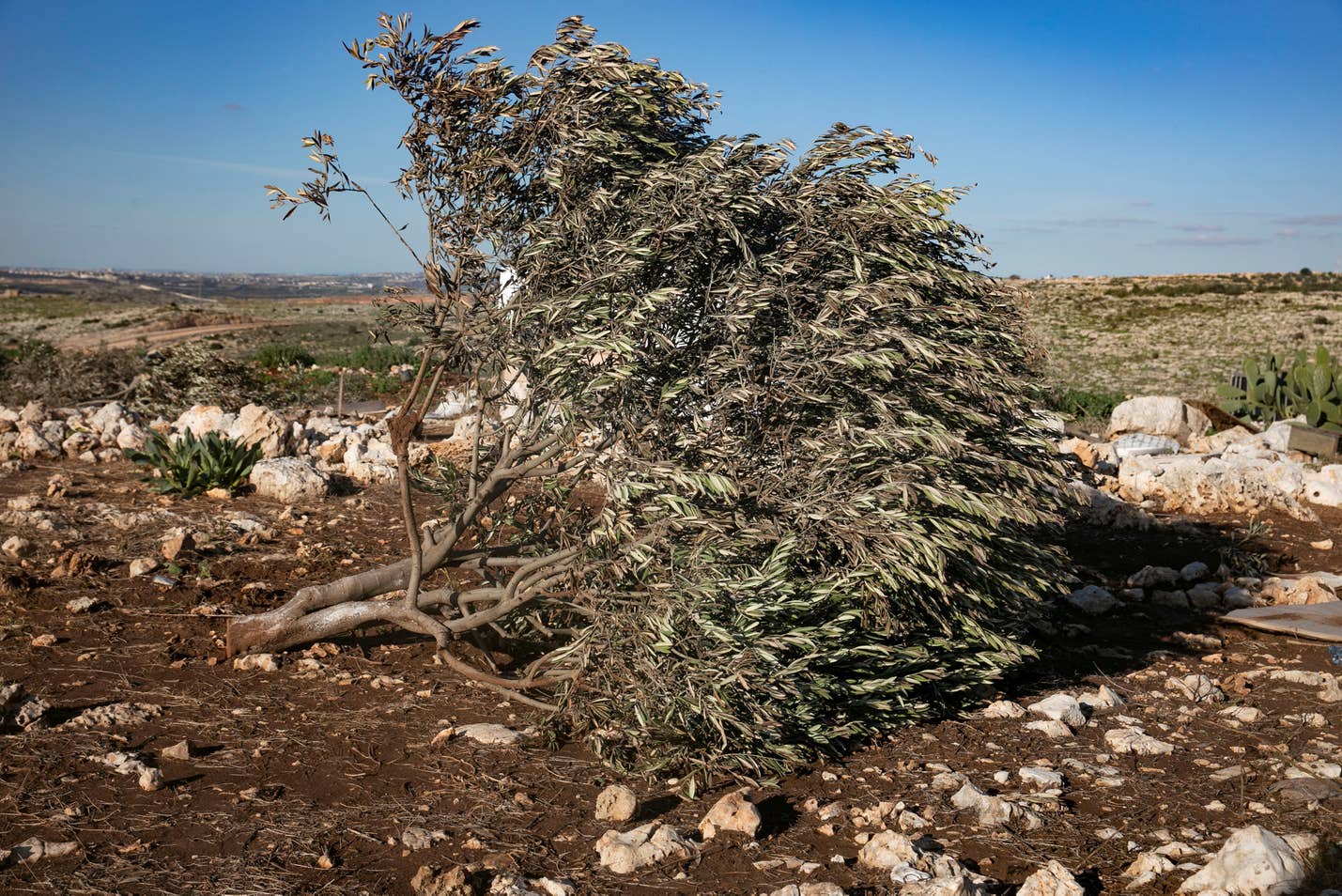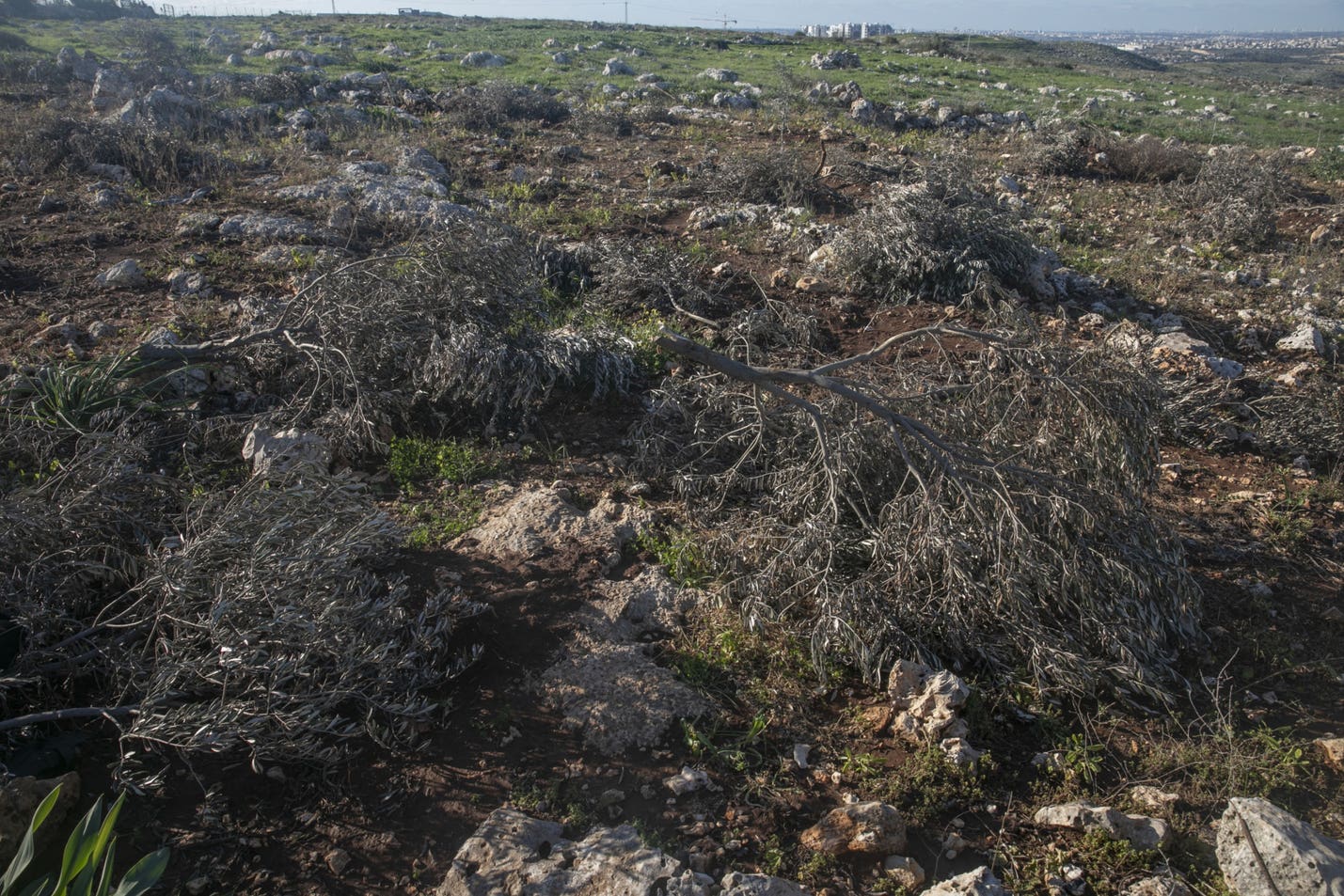Israel Is Recreating the Nakba, Without Putting Palestinians on Trucks
 Thursday, February 25, 2021 at 02:19PM
Thursday, February 25, 2021 at 02:19PM by Ilana Hammerman 25 February 2021 Haaretz

They’re closing in from all sides: the Jewish settlements on the Arab towns. Ariel, Revava, Kiryat Netafim, Barkan, Bruchin, Alei Zahav, Leshem, Yakir, Peduel, and Beit Arieh are spreading, approaching, and suffocating with fences and roads sown with roadblocks the city of Salfit and the towns of Kifl Haris, Haris, Brukin, Kfar al-Dik, Deir Balut and Deir Istiya. The vast municipal areas of the Jewish settlements, which were intended for their expansion, touch the Arab towns’ orchards and reach their houses. Some let their sewage flow into the villages, some have taken over springs and residents’ reservoirs and turned them into wading pools. Some sic their teenagers on farmers, to cut down and uproot their trees, to threaten, intimidate and destroy.
Israeli soldiers are aggressively doing the same. Bulldozers escorted by soldiers recently uprooted thousands of olive trees in Deir Balut and hundreds in Haris, and eviction orders are pending. One is for a resident of Kafr Hairs who owns a grove, who I met a few days ago accompanied by three other Jewish Israelis, one man and two women, activists from the Israeli group “dharma socially engaged.”
This is the duplicitous way of the present Nakba: there is no need to put people on trucks or expel refugees in convoys
It isn’t only God in the details, the devil’s there too. The document was not served to the grove’s owner. It had been filled out ahead of time in “the absence of the owner” (a uniform format distributed to Palestinians for years, in thousands of copies), for posting “in three copies, at three conspicuous points”; and this detail had already been written in by hand, because some forms are crammed under a rock in the field or placed on it, and some are taped to a wall, and the inspector is required to describe this to a certain extent. The inspector sent to the grove of the Kafr Haris resident wrote out the form messily, hastily, maybe fearing the owner would suddenly pop up and he would find himself facing a person.
The top of the form names, in Hebrew and Arabic, the authorities tasked with evicting the Haris resident from his land. A pile of authorities: “Israel Defense Forces, The Civil Administration for the Judea and Samaria Region, the Commissioner for Government Property, the Central Unit for Oversight.” All operate according to orders and laws and the provisions of laws, which are even listed in the form for the information of the person slated for eviction: “In my authority according to the Order on Government Property (Judea and Samaria) (Number 59) 5727 – 1967, and according to Article 2 of the Order on the Matter of Appointments and Responsibilities according to the Law on the Protection of Land and Government Property (Judea and Samaria Number 1006) 5742 – 1982, I hereby state that you are illegally holding the land described herewith.”
Here is the description of the place where the land is (in handwriting): “Northeast of Kiryat Netafim on the land of Kafr Haris” (Like this!). The land itself, now called “the land and the trespass” (Like this! The Israeli army and its administrative arms are defending the land of Kafr Haris from trespassing village residents): “Olive trees in barrels, about 120, about 6.5 dunams” (1.625 acres). Appended to the document is an aerial photograph showing Kiryat Netafim and next to it a plot surrounded by a green line: This is the “trespass” area, according to the key at the bottom of the photograph. And now, Haris resident, you are required to “remove your hand from it and return to the land to its prior state within 45 days from the delivery of this order,” otherwise, “the responsible authority will act to carry out the eviction and will be empowered to charge you for the costs of the eviction.”
What is this Kiryat Netafim, because of which the small grove is slated to be uprooted because it touches the metal fencing and barbed wire of its expansions? A true place of beauty – read, believe and come: “Kiryat Netafim is a religious community in Samaria. The older and established community numbers about 200 families that enjoy a rich and lively community life. The young neighborhood being constructed in the community is the first significant expansion and is planned to attract young families seeking to improve and upgrade their standard of living and enjoy quality of life and a modern style of housing, in stylish and well-equipped apartments that offer residents a rich and pampered residential experience facing the beautiful landscape of Samaria” – says the developer.
This ad comes with a map showing that in this lovely vision, there is not even a single Arab community, just a very large number of Jewish communities.
- The Nakba - perpetuating a lie
- Palestinians uncover history of the Nakba, even as Israel cuts them off from their sources
- Burying the Nakba: How Israel systematically hides evidence of 1948 expulsion of Arabs
This is how the Nakba is being recreated in the West Bank, and not just there. From the southern Hebron Hills, Jordan Valley, Hebron, Bethlehem, Tul Karm through to Jenin; From Susya, Mevo’ot Yeriho, Efrat and Betar Ilit, Ariel and to Karnei Shomron, Hinanit and Shaked: Freedom, development and rule for the Jews only. This is the duplicitous way of the present Nakba: there is no need to put people on trucks or expel refugees in convoys. Aerial photographs of the authority called “the Civil Administration” already shows its presence well. The lands expropriated from non-Jewish presence are clearly marked on it; and on the ground, it advances in large steps toward ripping apart of the fabric of the life of millions of the Palestinian Arabs living here for generations.

Evil from a beloved country
Once they were farmers. Today they are construction workers and renovators in the settlements and cities of Israel, and work in Israeli Jewish industrial factories built on their lands (or on public lands that were supposed to serve their needs which Israel turned into “state land” for Jews only). This is conditional on possessing work permits, money to buy them from middlemen and the strength to leave their homes for the checkpoints before the break of dawn and return home after dark.
 APJP |
APJP |  Post a Comment |
Post a Comment |